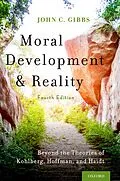Moral Development and Reality explores the nature of moral development, human behavior, and social interconnections. The exploration elucidates the full range of moral development, from superficial perception to a deeper understanding and feeling through social perspective-taking. By comparing, contrasting, and going beyond the key theories of preeminent thinkers Lawrence Kohlberg, Martin Hoffman, and Jonathan Haidt, John C. Gibbs tackles vital questions: What exactly is morality and its development? Can the key theoretical perspectives be integrated? What accounts for prosocial behavior, and how can we understand and treat antisocial behavior? Does moral development, including moments of moral inspiration, reflect a deeper reality? This fourth edition of Moral Development and Reality is thoroughly updated, refined, and expanded. A major addition considers Paul Bloom's important challenge to Hoffman's theory. This book will have broad appeal across academic and applied disciplines in social and developmental psychology, education, the helping professions, and human development. Complete with case studies and chapter questions, it serves especially well as a text in advanced undergraduate and graduate courses in social and developmental psychology, education, the helping professions, and human development.
Autorentext
John C. Gibbs is Professor of Developmental Psychology at The Ohio State University, Columbus. His research interests include cross-cultural sociomoral development, parental socialization, empathy, prosocial behavior, and antisocial behavior. Dr. Gibbs developed a major intervention program for antisocial youth and has established assessment measures of moral judgment, moral identity, social perspective taking, self-serving cognitive distortions, and social skills. In addition to his books, Dr. Gibbs has authored or coauthored over 90 book chapters and articles on topics pertaining to moral development and reality.
Zusammenfassung
Moral Development and Reality explores the nature of moral development, human behavior, and social interconnections. The exploration elucidates the full range of moral development, from superficial perception to a deeper understanding and feeling through social perspective-taking. By comparing, contrasting, and going beyond the key theories of preeminent thinkers Lawrence Kohlberg, Martin Hoffman, and Jonathan Haidt, John C. Gibbs tackles vital questions: What exactly is morality and its development? Can the key theoretical perspectives be integrated? What accounts for prosocial behavior, and how can we understand and treat antisocial behavior? Does moral development, including moments of moral inspiration, reflect a deeper reality?This fourth edition of Moral Development and Reality is thoroughly updated, refined, and expanded. A major addition considers Paul Bloom's important challenge to Hoffman's theory. This book will have broad appeal across academic and applied disciplines in social and developmental psychology, education, the helping professions, and human development. Complete with case studies and chapter questions, it serves especially well as a text in advanced undergraduate and graduate courses in social and developmental psychology, education, the helping professions, and human development.
Inhalt
Foreword by David Moshman Preface Acknowledgments 1. Introduction 2. Beyond Haidt's New Synthesis 3. "The Right" and Moral Development: Fundamental Themes of Kohlberg's Cognitive Developmental Approach 4. Kohlberg's Theory: A Critique and New View 5. "The Good" and Moral Development: Hoffman's Theory and Its Critics 6. Moral Development, Moral Identity, and Prosocial Behavior 7. Understanding Antisocial Behavior 8. Treating Antisocial Behavior 9. Beyond the Theories: A Deeper Reality? 10. Conclusion Appendix Notes References Index
